Spain Last Name Origin, History, and Meaning
Where did the surname Spain come from? What does the surname Spain mean? Discover the history and meaning of the last name Spain and family migration on YourRoots Map.
Surname Spain Origin: What does the last name Spain mean?
The surname Spain has origins in Norman, English, and Irish cultures, with records dating back to the early 13th century. It was closely associated with Spain and Belgium in the 14th to 15th centuries and saw significant growth in England from the 16th to the 18th centuries. By the 20th century, the surname had spread globally, with a notable presence in the United States, England, Belgium, and Spain, among other countries.
YourRoots data highlights the historical distribution of the Spain surname, showing its growth and prominence in various regions worldwide. The surname's rich history reflects a diverse cultural heritage and a widespread presence across different countries, making it a significant and enduring part of genealogical records.
Spain Last Name History: Where did the last name Spain come from?
Origin of Spain Surname: Where does the last name Spain originate from?
According to YourRoots data, the surname Spain first appeared in records from Spain around the early 13th century. Please note that this reflects only YourRoots data for the exact Spain spelling and does not include other record sources or surname variations.
History of the Last Name Spain: What does the Spain surname history look like in the early days?
The Spain surname remained closely associated with Spain and Belgium from the 14th to the 15th centuries, with significant growth seen in England (United Kingdom) from the 16th to the 18th centuries. YourRoots data also shows Spain family records in the United States, highlighting a broader historical distribution.
Global Spread: Where can we find the Spain surname today?
By the 20th century, the volume of records with the Spain surname grew significantly in the United States. The Spain surname remains prominent in the United States, with notable presence in countries such as England (United Kingdom), Belgium, and Spain. It appears in many countries, including various other regions worldwide.
Explore Spain last name heritage and Spain surname origin based on YourRoots Map data
 VIEW THE ORIGIN OF SURNAME SPAIN
VIEW THE ORIGIN OF SURNAME SPAINFamous People With Spain Surame?
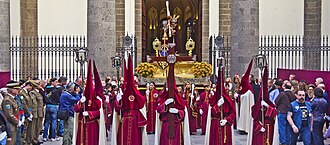
Holy Week in Spain
Holy Week in Spain (Semana Santa) is a significant Catholic tradition celebrated with processions across Spanish cities during the final week of Lent before Easter. Brotherhoods and fraternities don traditional robes, masks, and carry ornate floats depicting scenes from the Passion of Jesus Christ. The event attracts tourists worldwide and has been recognized as a Fiesta of International Tourist Interest. Notable regions for Holy Week include Andalucía, with cities like Málaga, Granada, and Sevilla hosting elaborate celebrations. Almería and Cádiz are also known for their vibrant Holy Week traditions, showcasing a rich cultural and artistic heritage.
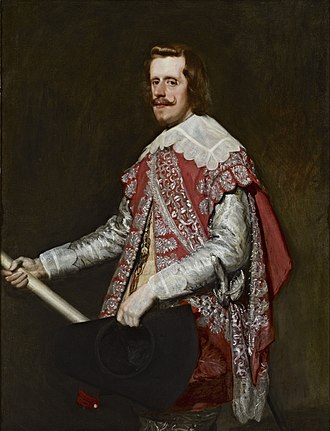
Philip IV of Spain
Philip Domingo Victor de la Cruz de Austria y Austria, known as Philip IV of Spain (April 8, 1605 – September 17, 1665), was a patron of the arts and ruler of Spain during the Thirty Years' War. He had a large family with two wives and was known for his interest in astrology and literature. Though seen as a serious and solemn figure in public, privately he was described as kind, gentle, and fun-loving. Philip's reign saw the expansion of the Spanish Empire but also internal decline, attributed to his struggles with domestic and military reform. His legacy is debated, with some praising his energy and others critiquing his delegation of power to ministers.
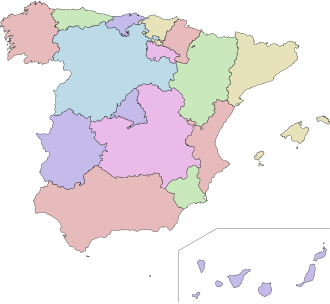
Autonomous communities of Spain
The Autonomous communities of Spain, established in 1978, are the first-level administrative divisions of the country. Comprising 17 autonomous communities and two autonomous cities, these regions exercise self-government within the limits set by the constitution. Each community has its own Statute of Autonomy, defining its devolved powers. The unique decentralization model has been described as a federal system with certain peculiarities, allowing for a mix of central and regional governance. With varying degrees of power devolution, Spain's system is a balance between unity and diversity, shaping its political landscape and historical development.
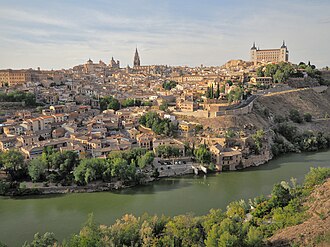
Toledo, Spain
Toledo, Spain is a city and municipality in central Spain with a rich history dating back to Roman times. The city served as the capital of the Visigothic Kingdom and later became an important cultural center during the Islamic period. After the Christian conquest in 1085, Toledo continued to thrive as part of the Crown of Castile, open to diverse influences from Muslim and Jewish communities. Known for its Gothic Cathedral and production of bladed weapons, Toledo was declared a UNESCO World Heritage Site in 1986. Today, the city continues to be a vibrant hub of Spanish history and culture, attracting visitors from around the world.
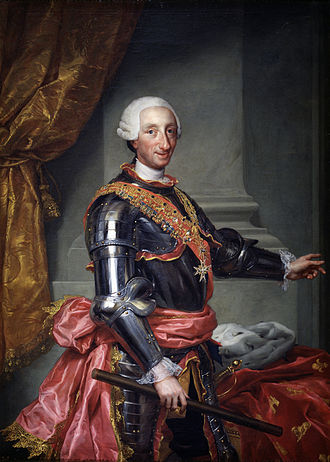
Charles III of Spain
Charles III of Spain (Jan 20, 1716 – Dec 14, 1788) was King of Spain from 1759 to 1788. He implemented reforms to increase revenue, modernize agriculture, and promote science. A proponent of enlightened absolutism, he expelled the Jesuits and fostered the Enlightenment in Spain. Charles strengthened the military and navy and enacted reforms in the Spanish Empire, leaving a lasting legacy. His reign marked a period of significant change in Spain and its overseas territories.
All images displayed on this page are sourced from Wikipedia or Wikimedia Commons.We use these images under their respective Creative Commons or public domain licenses. Wherever applicable, author attributions and license information are provided. If you believe an image is used incorrectly or outside its license terms, please contact us so that we can review and correct the issue.




.png)